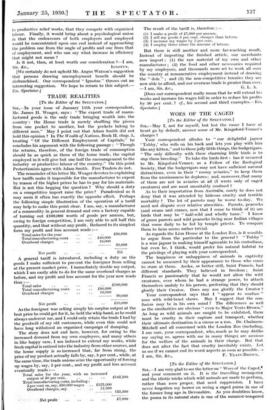TRADE REALITIES
[To the Editor of the SPECTATOR.] Sta,In your issue of January 11th your correspondent, Mr. James H. Wcager, says : " The export trade of manu- factured goods is the only trade bringing wealth into the country : the Home trade is merely shuffling the pieces from one pocket to another, but the pockets belong to different. men." May I point out that Adam Smith did not hold this opinion ? In The Wealth of Nations, Book II. chap. 5, treating " Of the Different Employment of Capitals," he concludes his argument with the following passage : " Though the returns, therefore, of the foreign trade of consumption should be as quick as those of the home trade, the capital employed in it will give but one half the encouragement to the industry or productive labour of the country." On this point Protectionists agree with Adam Smith. Free Traders do not.
The remainder of his lett& Mr. Weager devotes to explaining how tariffs make it impossible for the manufacturer to export by reason of the higher prices he has to pay for his materials. But is not this begging the question ? Why should a duty on a. competitive import raise the price? Paradoxical as it may seem it often has exactly the opposite effect. Perhaps the follciwing simple illustration of the operation of a tariff may help to make this point clear. I am, say, a manufacturer of a commodity in general demand and own a factory capable of turning out £100,000 worth of goods per annum, but, owing to foreign competition, I am only able to sell half this quantity, and that without any profit. Reduced to its simplest form my profit and loss account reads :— Total sales for the year £50,000
Total manufacturing costs .. £40,000 Overhead charges 10,000 Net profit .. • • .. • • Nil
A general tariff is introduced, including a duty on the goods I make sufficient to prevent the foreigner from selling at the present market price. I immediately double my output, which I am easily able to do for the same overhead charges as before, and my profit and loss account for the year now reads thus :-
Total sales
Total manufacturing costs £80,000 £100,000 10,000 Overhead charges 90,000 Net profit £10,000
As the foreigner was selling simply his surplus output at the best price he could get for it, he held the whip hand, as he could always undercut me, and I could only retain the trade I had by the goodwill of my old customers, while even this could not have long withstood an organized campaign of dumping.
The story does not end here, however, for owing to the increased demand from my own employees, and many others in like happy case, I am induced to extend my works, while fresh capital is enticed into the industry from other sources, and the home supply is so increased that, far from rising, the price of my product actually falls by, say, 5 per cent., while, at the same time, the trade unions seize the opportunity of forcing up wages by, say, 5 per cent., and my profit and loss account eventually reads:
Total sales for the. year, with an increased
output of 50 per cent. £142,500 Total manufacturing costs, including :
5 per cent on, say, £60,000 wages .. £123,000
Overhead charges, say .. .. 12,500 135,500 • • - Net profit • . £7,000 50,000
The result of the tariff is, therefore :—
(1) I make a profit of £7,000 per annum. (2) I sell my goods 5 per cent. cheaper than before. (3) I increase my wages by 5 per cent.
(4) I employ three times the amount of labour.
But there is still another and more far-reaching result. Instead of importing the finished article, our merchants now import : (1) the raw material of my own and other manufactures ; (2) the food and other necessaries required by my employees, and thousands more set to work all over the country at remunerative employment instead of drawing the " dole " ; and (3) the non-competitive luxuries they are now able to afford, and our overseas trade is greater than ever.
[Does our correspondent really mean that he will extend his works and increase his wages bill in order to reduce his profits by 30 per cent. ? cf., his second and third examples.—En. Spectator.]






































 Previous page
Previous page